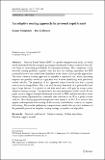An adaptive routing approach for personal rapid transit
Author(s)
Schüpbach, Kaspar; Zenklusen, Rico
Download186_2012_Article_403.pdf (439.3Kb)
PUBLISHER_POLICY
Publisher Policy
Article is made available in accordance with the publisher's policy and may be subject to US copyright law. Please refer to the publisher's site for terms of use.
Terms of use
Metadata
Show full item recordAbstract
Personal Rapid Transit (PRT) is a public transportation mode, in which small automated vehicles transport passengers on demand. Central control of the vehicles leads to interesting possibilities for optimized routings. The complexity of the involved routing problems together with the fact that routing algorithms for PRT essentially have to run in real-time often leads to the choice of fast greedy approaches. The most common routing approach is arguably a sequential one, where upcoming requests are greedily served in a quickest way without interfering with previously routed vehicles. The simplicity of this approach stems from the fact that a chosen route is never changed later. This is as well the main drawback of it, potentially leading to large detours. It is natural to ask how much one could gain by using a more adaptive routing strategy. This question is the main motivation of this article. In this paper, we first suggest a simple mathematical model for PRT, and then introduce a new adaptive routing algorithm that repeatedly uses solutions to an LP as a guide to route vehicles. Our routing approach incorporates new requests in the LP as soon as they appear, and reoptimizes the routing of all currently used vehicles, contrary to sequential routing. We provide preliminary computational results that give first evidence of the potential gains of an adaptive routing strategy, as used in our algorithm.
Date issued
2012-09Department
Massachusetts Institute of Technology. Department of MathematicsJournal
Mathematical Methods of Operations Research
Publisher
Springer Berlin Heidelberg
Citation
Schüpbach, Kaspar, and Rico Zenklusen. “An Adaptive Routing Approach for Personal Rapid Transit.” Mathematical Methods of Operations Research 77.3 (2013): 371–380.
Version: Author's final manuscript
ISSN
1432-2994
1432-5217